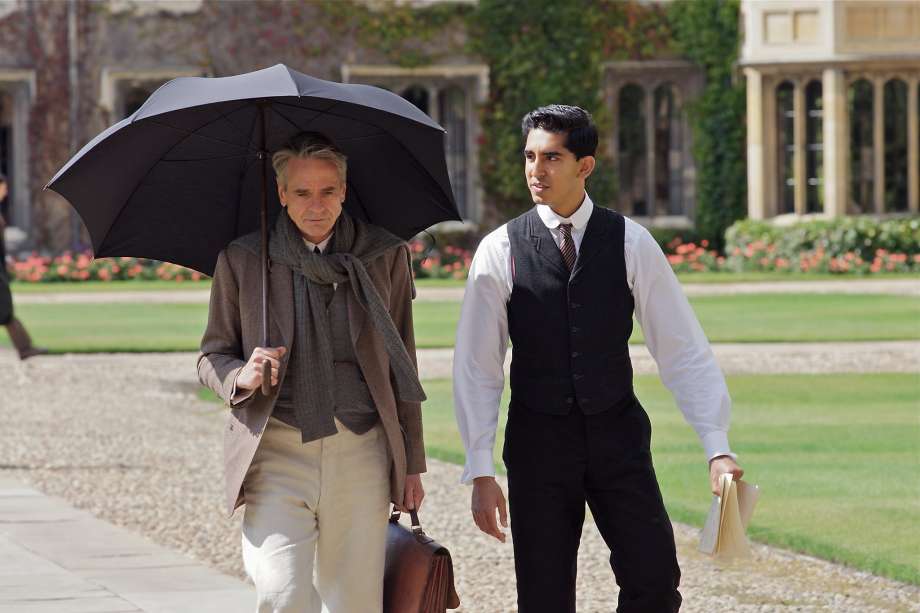
 The Man Who Knew Infinity looks at the life of Srinivasa
Ramanujan (Patel, Chappie), a mathematician from India who would become famous in the
math world for his prodigious work in the early part of the 20th
Century. Ramanujan had a gift for mathematics that was seemingly
ahead of what anyone else had been dealing with at the time, claiming
that the numbers and formulas just come to him out of divine origin.
His work would soon draw interest in England, causing Ramanujan to
leave his wife Janaki (Bhise, The
Accidental Husband) and mother (Nag, Paa)
behind to pursue his calling among
the top minds in the field at the time, hoping to realize his dream of
getting his mathematical journals published.
The Man Who Knew Infinity looks at the life of Srinivasa
Ramanujan (Patel, Chappie), a mathematician from India who would become famous in the
math world for his prodigious work in the early part of the 20th
Century. Ramanujan had a gift for mathematics that was seemingly
ahead of what anyone else had been dealing with at the time, claiming
that the numbers and formulas just come to him out of divine origin.
His work would soon draw interest in England, causing Ramanujan to
leave his wife Janaki (Bhise, The
Accidental Husband) and mother (Nag, Paa)
behind to pursue his calling among
the top minds in the field at the time, hoping to realize his dream of
getting his mathematical journals published.
Director and screenwriter Matthew Brown's film is diluted a bit by
focusing an inordinate amount of time for what should have been a
supporting character, Ramanujan's mentor at Trinity College in
Cambridge, England, G.H. Hardy (Irons,
High-Rise). Hardy took Ramanujan under his
wing at a time when others discriminated openly to the young man, not
only because he was a Indian, as well as one who was mostly
self-educated, but that he also had not yet proven his many
revolutionary mathematical breakthroughs in the traditional manner of
scholars. It's a film about a man who took extraordinary risks
to realize his dream, and yet the filmmaking plays everything on the
safe side for the entire duration, content to cast as wide a net as
possible, unwilling to risk losing any particular swath of the viewing
public by trying to be emotional insightful or requiring any effort of
intellectual investment.
As an atheist who doesn't believe anything based on faith and
intuition, Hardy is skeptical about this young man, demanding that
before he accepts the work, Ramanujan will have to show his proofs,
which doesn't come as naturally to him, having done all of his work
outside of the realm of formal academia. While Hardy is shown as
instrumental in getting the rest of the faculty at large to take
Ramanujan as a credible colleague, the film's elevation of Hardy to a
co-lead character is the kind of thing that so often occurs when films
need funding to bring to life. They feel they need a known actor
(generally a white actor) to sell the film to certain critical
markets, and the story gets re-tooled to get the funding necessary to
finally get it made, even if it comes at the expense of the integrity
of the work. (It should be noted that Jeremy Irons, is about
thirty years older than the real-life Hardy during the events of the
film.)
A good deal of the drama of the film deals with Ramanujan's difficulty
in assimilating to his new environment of wealth and privilege in
England, coming straight from a life of poverty and religious
community in Madras (now Chennai) in India, as well as his difficulty
in channeling his knowledge into the traditional style of British
mathematics taught in the highest levels of academia. As such,
his enthusiasm begins to wane as he is confronted by a perceived lack
of belief in his work without proofs, as well as the glass ceiling he
begins to realize exists for those who aren't already part of the
old-boys club of white men of a certain class and privilege, most of
whom would rather not even address Ramanujan's next-level math
theories, much less try to understand them.
Brought up with a strict vegetarian diet due to his religious
convictions, Ramanujan also has difficulty eating in a place where
meat is consumed at nearly every meal, and even vegetables are cooked
in animal fat, he begins to miss the comfort of being back home, with
his wife, his people, and his way of life. Further compounding
the issues is the lack of communication going back and forth to his
wife, thanks to the meddling of his mother, who doesn't want Ramanujan
to permanently uproot away from her by bringing the love of his life
to him in England.
Although the life of Ramanujan is a matter of history, well known
among mathematicians and other scholars of the era, as the vast
majority of those who watch The Man Who Knew Infinity will be
unfamiliar with the man in question's life and work, I'll refrain from
talking about what importance he ultimately plays that makes him
worthy of a film, and what happens during the rest of his life beyond
his initial pursuits in England. However, what I will say that
though there may be a couple of genuine surprises her and there, and
the film benefits from an interesting subject and actors of good
quality, there is a by-the-numbers delivery to the story that makes it
feel less inspiring as one might imagine such a film should be.
Also, with the exception of one specific formula, and the looks of
astonishment of those we're told have nearly unparalleled IQs, the
film delves very little on the specifics of Ramanujan's work, or what
truly what makes it so revolutionary.
After similar films on groundbreaking figures in the realm of math and
science such as Alan Turing in The Imitation Game
and Stephen
Hawking in The Theory of Everything, The Man Who Knew
Infinity feels like a lesser effort all around, in production and
execution, mostly because it lacks a thematic through-line to elevate
the story into something more artistic than just a collection of
historical achievements embellished by a friendship that may or may
not have been there, abusive acts of racism that may not have actually
happened, and an unnecessary love story that feels more like a
sugar-coated selling point. While it's enjoyable and interesting
enough for a recommendation for general audiences, and the terrific
work by Patel and Irons brings many scenes to life, there's still an
aftertaste to the watered-down, audience-friendly way Brown has
determined to tell his tale. Such a complex subject deserves
more complexity in bringing his story to life. Any man whose work is
still being used to study black holes shouldn't suffer the irony of
having to share the spotlight.
Qwipster's rating
:







©2016 Vince Leo

 The Man Who Knew Infinity looks at the life of Srinivasa
Ramanujan (Patel,
The Man Who Knew Infinity looks at the life of Srinivasa
Ramanujan (Patel,